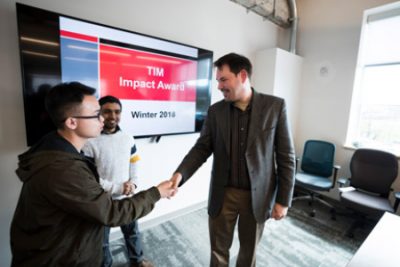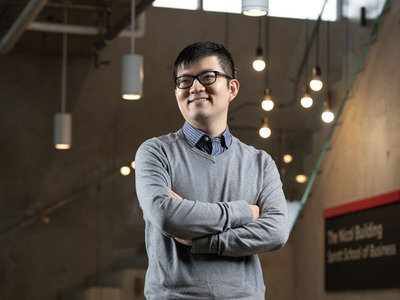By Tyrone Burke
Photos by Chris Roussakis
 The City of Ottawa’s staff was growing, its ranks swelling with tech-savvy young people who value mobility and said they wanted to telework. When a cloud-based IT infrastructure was introduced, it should have ushered in a new era of flexible work arrangements that made everyone’s life easier and more efficient.
The City of Ottawa’s staff was growing, its ranks swelling with tech-savvy young people who value mobility and said they wanted to telework. When a cloud-based IT infrastructure was introduced, it should have ushered in a new era of flexible work arrangements that made everyone’s life easier and more efficient.
But it didn’t. Staff remained anchored to their cubicles, day after day, despite the pressure it was placing on office space and infrastructure.
Why?
“I asked, what are the things preventing people from working more from home?” says Saswat Mohalik, whose Adaption to work from home in a public sector master’s project shared top prize at the TIM Impact awards, which recognized five of the best master’s projects from Carleton’s Technology Innovation Management (TIM) program.
The interdisciplinary graduate program for aspiring entrepreneurs is jointly run by the Faculty of Engineering and Design, Sprott School of Business, and Faculty of Graduate and Postdoctoral Affairs. It pairs graduate students with clients who need real-world solutions.
“One problem was that people feel a negative image might be created with managers,” Mohalik says. “So I recommended to encourage employees to fix one day a week to work from home, and on that day managers will say, ‘OK, go ahead and work from home.’ There won’t be any career disadvantage. You’ll get your promotions and everything. What we need is for the work to be done.’”
Mohalik also recommended education sessions for old guard managers who equate telework with slacking.
“Technological advancement and collaboration tools allow managers to see how much time an employee is available during the day,” he says, “and how much time they’re not. Those types of things should be used to track their work.”
Mohalik’s research shared the top honour with Haiwen Hou, whose Using topic modeling to examine the application of machine learning in cybersecurity startup offers used a machine learning technique that recognizes hidden semantic structures in text to better understand and categorize the product offerings of cybersecurity companies. Hou’s technique can be applied to other market research and competitive analysis problems. His client was Global Cybersecurity Resource.
Mohalik and Hou shared the stage with three other top students:
- Majd Albatta’s A business model replication approach to the global expansion of a new venture – A case study of Nutrafinna Inc. used business model replication as a basis to recommend internationalization strategies for an Ottawa startup with global aspirations for its custom meal plan business. Albatta analyzed Nutrafinna’s current business model and identified aspects that could be replicated in Dubai when the company expands there, as well as operational changes that will be required due to local market conditions and requirements.
- Farzi Khazai’s Twitter Span and Phishing Model Detection identified and categorized the characteristics of accounts used in sophisticated phishing scams for the Global Cyber Safety Institute so that they can be more readily recognized.
- Arushi Sharma’s Plan for ForwardHop to enter the international market researched market entry for the delivery of online courses, seeking to understand necessary steps before selling courses in international markets, and how ForwardHop can systematically identify and prioritize those markets.
This year’s group of students was the first to be considered for the TIM Impact Award, but there’s a good chance they won’t be the last.
“We’re always experimenting,” said TIM Prof. Steven Muegge, “and this was something new that may very well continue. The students gave short presentations about finished projects to those at an earlier stage in their work. Every student in the TIM program writes a thesis or a project as their capstone deliverable for the program. Our projects all have clients, solve real- world problems and make an impact on the community. We wanted to present some good examples.”
At the program’s Bayview Yards facility the room was packed, the presentations concise and the Subway sandwiches fresh.
“We deliberated for some time,” says Muegge, who judged the competition with Dan Craigen, director of Global Cybersecurity Resource, and Ludovico Prattico, intake manager for the Lead to Win accelerator.
“There were two projects that really stood out, and there were stronger elements for both projects. And we decided to split the award.”
The Impact Award came with a $1,000 prize, and though the judges initially split the purse between the two winners, TIM Director Tony Bailetti stepped in with another $1,000, sending both Hou and Mohalik home with the full amount.
For Bailetti, it was something of a parting gift. A Carleton faculty member since 1979, he’s stepping down as TIM director this year to give other faculty members experience running the program. But he won’t go far. Running TIM is a complex job and Bailetti plans to lend a guiding hand.
“I have two more months before I have to be nice,” Bailetti says. “We put these kids through hell, “We flunk a lot, and I don’t apologize. We’re totally committed to quality. Most of these guys will get jobs. The two winners, they’re working. We spend a lot of time making sure their capabilities are a match with what industry wants.”
Wednesday, May 2, 2018 in Campus News
Share: Twitter, Facebook



